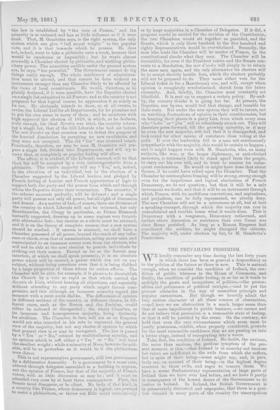THE ELECTORAL REVOLUTION IN FRANCE.
the law is established by " the vote of France," and the minority is as unheard and has as little influence as if it were dead. That, M. Gambetta says, is the right system, the only system which can give " full moral weight " to the popular vote, and it is that towards which he presses. He does not, indeed, want to take a pldbiscite once e week, because that would be cumbrous or impossible ; but he wants almost avowedly a Chamber elected by pldbiscite, and wielding pldbis- citary power. The minorities audible under the present system are, he says, "too powerful." The Government cannot do big things easily enough. The whole machinery of administra- tion must be altered, and that cannot be done without an instrument stronger than any Chamber likely to be affected by the views of local constituents. He would, therefore, as he plainly declared, if it were possible, have the Deputies elected on a single list submitted to all France; and as the country is not prepared for that logical course, he approaches it as nearly as he can. He obviously intends to draw, or, at all events, to revise, the Liberal List for all Departments, for he promises not to put his own name in many of them ; and he mentions with high approval the election of 1876, in which, as he declares, truly enough, his ideal &rutin was tried, the country return- ing a single list, that of the 3G:3 Liberals who had sat before. The mot d'ordre on that occasion was to defeat the purpose of the hurried dissolution by accepting no new candidates, and they were not accepted. The old " list " was returned intact. Practically, therefore, we may be sure M. Gambetta will pre- pare a single list, divided into Departments, and will try to carry that, as completely as popular, feeling will allow. The effect, it is evident, if the Liberals succeed, will be that their list will be accepted by a vote indistinguishable from a plebiscite. The entire majority will say " Yes," not, indeed, to the elevation of an individual, but to the election of a Chamber suggested by the Liberal leaders, and pledged by French Feeling of honour and French appreciation of logic to support both the party and the person from which and through whom the Deputies derive their nomination. The minority, if the scheme succeeds pettedly, will be defunct ; and a single party will possess not only all power, but all right of discussion and demur. As a matter of fact, of course, there are divisions of the country in which Liberals will not be returned, but only Reactionaries, the Clergy in particular, as Prince Bismarck instantly suggested, drawing up in some regions very formid- able alternative lists ; but success as a whole must be attained, and it is on the theory of complete success that a new system should be studied. If success is attained, we shall have a Chamber possessed of all power, beyond the reach of any influ- ence or check, even that of assassination, acting as one man, and emancipated to an immense•extent even from the electors, who will not be able at the next election to punish individuals by striking out their names. Except so far as the Senate may interfere, of which we shall speak presently, it is an absolute power which will be created, a power which can act on any subject, without being conscious even that it is being disliked by a large proportion Of those whom its action affects, The Chamber will be able, for example, if it pleases, to disestablish the Church by a vote as rapid as that which carried the &rutin de Lisle, without hearing all objections, and especially without attending to any party which might favour com- promise, and this although an immense minority regard the measure with a most acute dislike. The differences of opinion in different sections of the country, in different classes, in dif- ferent races, such as the Breton and the Parisian, would either be unheard or disregarded ; the whole Chamber, or its immense and homogeneous majority, being distinctly for abolition. The Chamber, in fact, will act as an Emperor would act who intended in his acts to represent the general view of the majority, but not any shades of opinion by which that general view is or may be variegated. The law is passed by a " Yes " or " No," uttered by multitudinous mouths, and no opinion which is ndt either a Yes " or " No " will have the smallest weight ; while a minority of Noes, however formid- able, will be as powerless as it would be if the plebiscitum were direct.
This is not representative government, still less government by a deliberative Assembly. It is government by a mass vote, uttered through delegates assembled in a building to express, not the opinion of Franco, but that of the majority of French voters, with as little discussion as may be ; and it must be attended very soon by at least three consequences. First, the Senate must disappear, or be silent. No body of that kind, in a country like France, where democracy is logical, can pretend to resist a plebiscitum, or throw out Bills voted unanimously or by huge majorities in a Chamber of Delegates. If it did, a proposal would be carried for the revision of the Constitution,. the two Chambers would sit together as provided, and the Senate, which is only three hundred to the five hundred and eighty Representatives, would be overwhelmed. Secondly, the in' an who leads the Chamber will be master of France, be the constitutional checks what they may. The Chamber will be irresistible, for even if the President resists and the Senate con- sents to a dissolution, the mot d'ordre will simply be to return the same men again, and the only alternative for electors will be to accept directly hostile lists, which the electors probably will not be prepared to do. They must either vote for the Liberal ticket or for a Reactionary one, and will, except when opinion is completely revolutionised, shrink from the latter extremity. And, thirdly, the Chamber must constantly act blindfold. It is sent up to support a certain policy. By-and- by, the country thinks it is going too far. At present, the Deputies, one by one, would feel that change, and tremble for their seats. But under the new system they will be intent, not on watching fluctuations of opinion in their constituencies, but on keeping their places in a party List, from which every man who " bolts" or " jibs '' will be relentlessly struck out. They will therefore press forward, till the growing minority, or it may be even the new majority, will feel that it is disregarded, and look round for other means of resistance than voting at the polls. If ever the leadership fell to a man not continuously sympathetic with the majority, this would be certain to happen ;. and it might happen even with M. Gambetta, who, on many subjects, like war, or the larger diplomacy, or anti-clerical measures, is extremely likely to stand apart from the people, to carry out his own will, and to trust to success for subse- quent condonation. Ho would or might have done that about Greece, if he could have relied upon the Chamber. That the- Chamber he contemplates framing will be strong, strong enough even for the impatience and logical absolutism of French Democracy, we do not question ; but that it will be a safe instrument we doubt., and that it will be an instrument through which France, with its multiform convictions, and aspirations,. and prejudices, can bo fully represented, we utterly deny. The new Chamber will not be a microcosm at all, but at best a speaking-trumpet, through which the majority can roar in. unmodulated and terrible tones what it wants done. This is Democracy with a vengeance, Democracy enthroned, and farther above discussion or resistance than ever Caesar was since Rome perished. As long as a Roman Emperor had conciliated the soldiers, he might disregard the citizens. The majority will, under election by list, be It Gambetta's Praetorians.



































 Previous page
Previous page